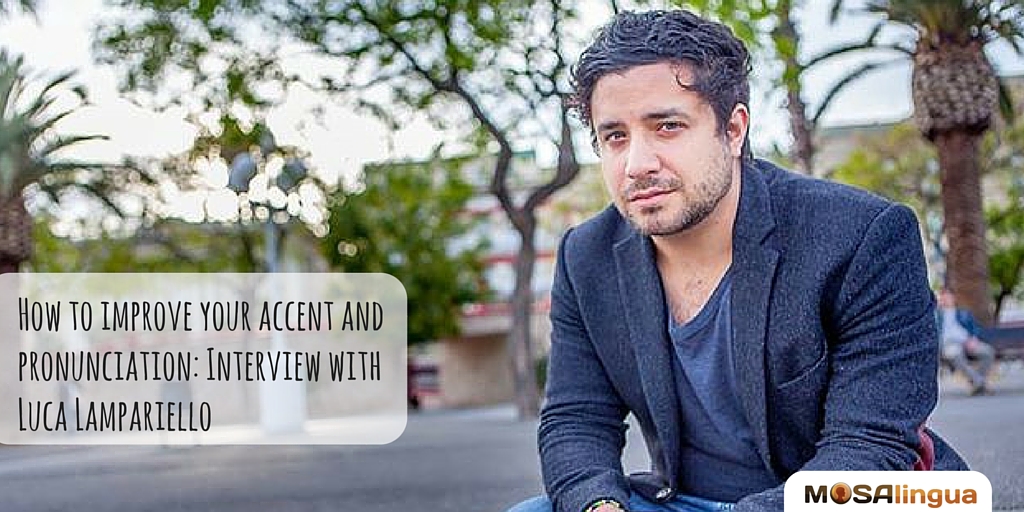Luca Lampariello is an amazing fellow polyglot (Italian like me) who has learned 11 other languages besides his native tongue– English, French, German, Spanish, Swedish, Russian, Dutch, Portuguese, Japanese, Russian and Mandarin Chinese. I had a chance to interview him and pick his brain on his methods for how to improve pronunciation and fluency and aa new language. I was excited to do the interview as I’ve admired him for quite some time, not only for his language skills, but also his capacity to share his passion for languages and learning a new language.
Read the transcript or watch the video on learning a new language to learn about the following:
- The techniques that Luca Lampariello used to learning a new language and reach native like fluency
- What Luca Lampariello considers the two most important tips to improve your accent in any language as an adult
- The number one secret on how to improve pronunciation
- The answer to the question “Is it important to get a native-speaker accent?
- And more on learning a new language!
You can find more about Luca Lampariello and his methods learning a new language at www.lucalampariello.com.

The Video on How to Improve Pronunciation and Accent and Learning a New Language
Interview Transcription on Improving Pronunciation and Accent and How to Learning a New Language
Luca (MosaLingua)
– Hi Luca, how are you doing?
Luca Lampariello
– Hey! Hi, everything is great here in Russia. What about you? Where are you?
Luca (MosaLingua)
– I’m fine. I’m in Lyon, France.
Luca Lampariello
– Oh! You’re in France?
Luca (MosaLingua)
– Yeah, France (Lyon). So, first of all thank you very much for joining me today. Yeah, thank you. Before getting started, could you please introduce yourself and tell us a little bit about your language background and your general background, please?
Luca Lampariello
– OK. So, first of all, thank you for inviting me. My name is Luca, like you. I am from Rome, I am Italian, just like you. And to give you a little bit about my language background I work as a language coach and also have a company that has to do with language learning. But, I also have a scientific background which is what I started with. I hold a degree in electronic engineering, and I graduated at La Sapienza University of Rome. So this is more or less, a general background.
Luca (MosaLingua)
– Yeah, we should mention that you speak a lot of languages. I think it’s twelve languages, right?
Luca Lampariello
– Yes, I always say Italian plus eleven other foreign languages.
Luca (MosaLingua)
– Well, I’d also like to speak a little bit about accent and pronunciation. So, we all know it can be hard to get a good pronunciation when learning a new language. How do you learn the specific sounds of a language at the beginning, during the first steps?
Luca Lampariello
– That’s also an interesting question. That goes back to what I was saying before on about the clarity and procedural memory. Do you know you the expression “To miss the forest for the tree?” You take a look at a tree, but you actually miss the forest around it. What happens when learning a new language is that…What happens when we, as adults or adults as they say. Think about it, if you’re a kid, children don’t just learn one specific sounds at a time. What they do is… they listen to the language, to entire chunks of the language, and then they make out the single words that make out the flow. So what they do is actually… They start from the top and they learn to extract sounds from the chunks of language, while adults focus on the single chunks, and then try to create sentences. To give you an example, for Mandarin Chinese, you know that Mandarin Chinese has syllables. Word have these four tones. And what happens is that foreign students learn the pronunciation of the single tones, and then they actually try to create sentences. But, Italian, if you think about it, also has tones. For example, If I say “voglio andare al mare” we say “Vo-glio an-da-re al ma-re.” It has different heights. So imagine that you, Luca, as a foreigner learning Italian, your target language, imagine having somebody tell you “OK, Luca, the word ‘Voglio’ is ‘vo-glio’, and then you have ‘an-da-re.” Leaving you to think about the syllables, and then having to put them together all while thinking about the meaning. You would say “I would never do that.” In contrast, what you did as a kid, you heard people say “voglio andare al mare” and then… which means, by the way, “I want to go to the sea.”
Luca (MosaLingua)
– It’s better to specify that.
Luca Lampariello
– This tells us that we should learn the single elements from its entire chunks and not the other way round. So what I do, long story short, I mainly have a top-down approach. I start from the upper layer by focusing on how entire sentences work, and then I go back and work on what they call the nitty-gritty, the nuts and bolts of the language, because later should you focus on the pronunciation. But the intonation at the beginning is something more illusive and more difficult to grasp. So, if you focus on the tree, you might miss the forest. You might pronounce single elements quite well, but then you have an intonation which is not natural. So, my suggestion is to always start by looking at the bigger picture, and then to go down. Obviously, I’m not saying you have to ignore the pronunciation, but my suggestion, my advise is to always take a look at the bigger picture. I always advise people and suggest people to look at the way sentences sound. Now, you might ask me what I mean by that? There are precise features that are called Super Segmental Features, “supra” = above the segments, the words that are specific to every language, but have common characteristics. And the reason why you don’t get to hear about them is because nobody teaches them in a very simple, pragmatical way. Though it is possible to do, people don’t think that it’s that important, but it is absolutely important. One last thing in this regard is something I learned when I used to attend conference interpreting school in Paris. I remember I was struck by something our teacher told us: “for an interpreter, the most important thing is not a single pronunciation, it’s not the pronunciation of a single element, it’s intonation.” If you pronounce the intonation the wrong way, you may pronounce it perfectly, but you won’t convey the right meaning. For an interpreter this absolutely paramount.
Luca (MosaLingua)
– Yeah, in your opinion, why is it so hard for so many people to get the right pronunciation? You know it’s hard for us Italians, French People, for Spanish people and so on. It’s quite hard. Why, in your opinion, so many people are struggling with that part?
Luca Lampariello
-This is an interesting and difficult question to answer, because it has to do with two main reasons: first, it’s a linguistic reason. The reason why it’s difficult is that when learning a new language, we already have our native tongue, which is a system put into place, I see languages as systems. So we carry over the features of our system into another system. For example, an Italian might pronounce the following phrase like this: “I want to go to the sea.” Because, going back to what I was saying before, “voglio andare al mare” he or she carries over this intonation, which is not just intonation, but also pronunciation and other features, into English and other languages. So, it is true that there is difficulties which comes from the fact that we already have a system in place—we have to minimize the interference between these two. Secondly, the reason is psychological, because people, once they get used to their native language with its own pronunciation, they find it difficult to produce different sounds. I remember very well when I was learning English for the first time, I was practicing speaking with myself, and my friends used to make fun of me by imitating me and saying “nienienie”, because they weren’t used to hearing me speak in American English, and they thought it was very nasal. They were making fun of me. I didn’t care, but for some people this might isolate them out of their group. Because people identify themselves as belonging to a certain group of people, they tend to fall back within the category of their own group. So, the problem with language learning is that, on the one hand, we carry over the features of our native language. There is interference, which is inevitable, we cannot avoid it.
On the other hand, there is the psychological aspect. It’s not that people have good or bad ears, it’s about the brain and how they see themselves. So, it’s merely a psychological problem. If you can let yourself go, only then will you be able to pronounce the language in a different way. There is a very interesting experiment where they found out, and it’s strange but true, that shows that imitating an American accent in your own language helps you acquire a better American accent. For example, “Hey ciao, sono andato al mare.” Which is what Italians typically do when imitating Americans. This was a successful experiment which was conducted in India to help improve people’s pronunciation. You can use the IPA (the International Phonetic Alphabet) or do whatever you want, but if you don’t tackle the psychological aspect, there’s nothing you’ll be able to do about it. You’re not going to sound like a native, because you haven’t identified yourself with them, even if you know the sounds and the pronunciation of the language.
Luca (MosaLingua)
-Yeah, of course, because there are psychological barriers which can be very, very important to overcome for people when learning languages. For example, I have the very same experience with people wanting to learn French, and as you know, French has specific sounds and intonations. For example, the ‘r’ sound is very specific, which means that pronouncing that it’s very important to overcome the psychological part. Do you think it’s important to sound like a native speaker? For some, having a good pronunciation can be a very important goal as it will help them be better understood.
Luca Lampariello
-I think that sounding like a native is not a realistic goal for most people. It’s very difficult to sound like a native speaker, there are very few people who can actually do that. In order to do that, you have to have everything in place. You have to know how to tackle grammar, and be psychologically ready to identify yourself with another group, etc. But, I don’t think it’s strictly necessary to sound like a native speaker. Having a foreign accent could be nice. If you go to the United States, and you sound Italian or French, it’s a plus for a lot of people.
Luca (MosaLingua)
-Can you share some strategies and tips to improve one’s accent? Simple things you can do?
Luca Lampariello
-Well, something general you could first do first to improve your accent is to just stop a second, stop whatever you’ve been doing so far when trying to pronounce single sounds. Just take a step back and focus on how sentences are said by native speaker. My first piece of advice would be to possibly get hold of a text with audio and to simply start listening to it when slowed down. Slowing it down helps you appreciate the flow of the language. And in this case, I would start taking notice of the pauses taken. Pauses are those things that allow us not only to speak, but also to attach sentences together. Let me explain this more in detail, otherwise it sounds a little strange. When we speak, as I’m doing now, I introduce pauses in order to keep on going and etc. These pauses, however, are not just to allow me to breathe, they also allow me to go up and down with my voice and to convey meaning. If I tell you, for example, a very easy and simple sentence in English, “I want to go to Moscow, because I think it’s a wonderful city,” you notice that, something which is called ‘the frequency,’ goes up. Frequency includes things such as how many times your vocal chords vibrate per second. If they vibrate very slowly, you have a low frequency. When they vibrate very fast, you have a high frequency. And with European languages such as Italian, English and French, and most European languages, we tend to go up when it comes to attaching two sentences together. For example, my two hands represent two sentences. Here, I say “I want to go to Moscow,” and the link between the two in sound is your raising frequency. When you raise your frequencies, you show you’re about to say something else. If I say “Marco.” The intonation or frequency goes down, which means I’m done talking. But if I say “Marco,” you know I’m about to say something else, because I’m raising my pitch in an unconscious way, which is how we learned as kids to say we haven’t finished. That’s why, in what they call relative clauses, we say, for example “I want to learn a new language because,” or “she said that.” So, every time you have these types of sentences, the pitch goes up. My suggestion is to start noticing when your voice goes up, or when it goes down, because when it goes up it means that you’re introducing something such as a person, but going down means you’re finished delivering a piece of information. For example, “I talked to John.” “John,” falls down, it goes from high to low. And these two simple things—which have to do with something called ‘speech melody’—are the way, European languages are spoken. As for other languages such as Chinese, it’s a little different…This is what you should focus on. Think of, for example, a pencil…You can see it go up and down, this is a great help when it comes to reading yourself because you’re visualizing sounds patterns. And you’re doing something that nobody offers in terms of service. Nobody out there is telling you to look out for rising and falling tones. Actually, there are books that talk about this, however, they can be in very complicated terms sometimes.
So going back to my first suggestion, always remember about the forest. Don’t focus too much on the tree, or the trees, rather, focus on the forest itself—how sentences work in macro blocks—and this is the first thing you should do. Now, this is just one aspect of what they call “Super Segmental Features,” which is how a sentence is supposed to be pronounced. If you want to improve your pronunciation, don’t focus on single sounds, rather focus on the same sounds in sentences. So, for example, let’s suppose you’re learning French. People tend to focus on the different French sounds such as “on,” “en” and “un,” But what really counts is not how you pronounce single sounds, as no native speakers pronounce just the ‘r’ or just the ‘o’ by itself, rather how they say them in sentences. So, what you can do is to say short yet interesting sentences where you have all these sounds in them. And then you can practice these sentence…they have to be short… ay these short sentences, these chains of sounds instead of single sounds. What can happen is that if you focus too much on single sounds, you can end up being able to pronounce single sounds very well, but find it difficult to pronounce them naturally in sentences. For some strange reason, adults always start backwards. We start with the small things, and then we move on to sentences while we should actually start with sentences, maybe small or short ones, and then we should go back to single sounds.
Luca (MosaLingua)
– So, Luca, thank you very much for your time, you have given us a lot of useable insight and tips, it’s been a pleasure to talk to you. Thank you so much for taking the time to speak to me.
Luca Lampariello
– Thanks for inviting me, it was a pleasure.
Luca (MosaLingua)
– Thank you very much and all the best. Take care!
Luca Lampariello
– Goodbye, everybody. Thanks, from Russia!
Hopefully you found this interview informative on learning a new language and improve your pronunciation and accent! If you are interested in learning a new language, make sure to subscribe to our newsletter to keep up to date on our most useful articles that will help with learning a new language.
Related posts:
Want to start improving your language skills today?
Start learning a new language today

Good news: we can help!
More good news: you can get started for free! Start your free trial now and for the next 15 days, take advantage of the most effective language learning method on the market!
Vocabulary flashcards, videos with subtitles, audiobooks, articles adapted to your level – with MosaLingua Premium (Web & Mobile), you’ll have access to all this and more. Get started right now. It’s free—and risk-free—to try!




Comments